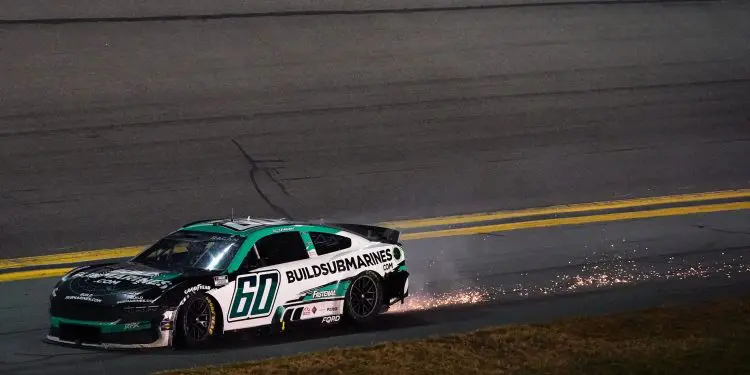In the high-octane world of NASCAR, where legacy teams dominate and breaking through feels impossible, one team has defied expectations time and again. Front Row Motorsports (FRM), the scrappy underdog that once struggled just to make the grid, is now challenging not only its competitors but the very foundations of the sport.
Their antitrust lawsuit, filed in partnership with 23XI Racing, questions NASCAR’s charter system and its impact on fairness and accessibility. For a team like FRM—once sustained by fast-food sponsorships and sheer determination—it’s the boldest move yet in their improbable rise.
The Humble Beginnings
FRM’s journey began in 2009 under the leadership of Bob Jenkins, a fast-food entrepreneur with over 200 franchise locations. In a NASCAR landscape dominated by well-funded powerhouses, Jenkins dared to dream big. The team’s early years were a struggle. Fielding the No. 34 car with John Andretti at the wheel, FRM’s debut season saw just two top-20 finishes, the best being 16th at New Hampshire.
Funding was tight, with Jenkins often relying on his restaurant empire to sponsor the team. Yet, amid the 2008 financial crisis, FRM found an unexpected opportunity: shrinking entry lists allowed them to secure a partnership with Earnhardt-Ganassi Racing, guaranteeing race qualifications through owner points.
The First Glimmers of Hope
By 2011, FRM began showing signs of potential. David Gilliland’s third-place finish at the Daytona 500 offered a glimmer of what the team could achieve. However, the breakthrough moment came two years later.
At the 2013 Talladega race, a chaotic and crash-filled day played perfectly into FRM’s hands. David Ragan and Gilliland executed a flawless tandem draft, catapulting Ragan to victory and delivering FRM its first-ever Cup Series win. It was a Cinderella moment that shocked the NASCAR world and proved the team’s resilience.
From Struggles to Stability
The Talladega triumph was monumental, but it didn’t magically solve FRM’s challenges. The team remained a perennial backmarker, scratching for sponsorships and scraping by with occasional top-10 finishes. In 2016, they capitalized on unusual weather conditions at Pocono, with Chris Buescher earning their second Cup win.
These victories were more than just morale boosters—they were proof that even a small team could rise above its limitations.
Turning the Corner
In recent years, FRM has taken significant strides toward consistent competitiveness. A key turning point came with the emergence of Michael McDowell, who delivered the ultimate underdog moment: winning the 2021 Daytona 500.
McDowell’s triumph wasn’t just a fluke—it was a testament to FRM’s growth as an organization. The team capitalized on NASCAR’s evolving regulations, which leveled the playing field and gave smaller teams a better shot at success.
Today, with McDowell and Todd Gilliland leading the charge, FRM has solidified its reputation as a team that can compete with the giants.
Taking on NASCAR’s Charter System
FRM’s antitrust lawsuit against NASCAR, filed alongside 23XI Racing, challenges the sport’s controversial charter system. Introduced in 2016, the system limits the number of guaranteed spots on the grid, creating a financial and competitive barrier for smaller teams.
For FRM, this legal battle is personal. They’ve fought tooth and nail to survive in a system that often feels rigged against underdogs. Team owner Bob Jenkins has been vocal about the need for greater fairness and accessibility in NASCAR, arguing that the current system stifles growth and innovation.
What’s Next for FRM?
As the legal drama unfolds, FRM remains focused on its mission to compete at the highest level. The team’s bold approach—both on and off the track—has made them a symbol of perseverance and grit in NASCAR.
Their story, from the back of the pack to Daytona glory and now a fight for the future of the sport, is a testament to what’s possible when ambition meets determination.
Legacy of an Underdog
Front Row Motorsports has redefined what it means to be an underdog in NASCAR. Whether through daring moves like the Talladega victory, their historic Daytona win, or their fight for equality in the sport, FRM has proved that no challenge is too great.
Their journey isn’t just about racing—it’s about breaking barriers and inspiring the next generation of dreamers.







